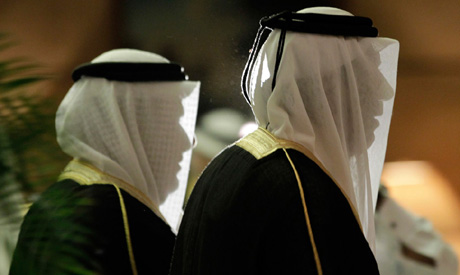
Bahraini Foreign Minister Sheik Khalid bin Ahmed Al Khalifa, left, and Qatar's Prime Minister Sheikh Hamad bin Jassim bin Jabr Al-Thani arrive at the GCC meeting in Manama, Bahrain when popular protests began, Feb. 17, (AP).
The decision of Saudi Arabia and other Gulf states to recall their envoys from Damascus reflects a tough new Arab stand on the Syrian regime's deadly crackdown on pro-democracy demonstrations.
"This is the first clear toughening" of the position of Saudi Arabia, the Sunni Arab heavyweight and leader of the oil-rich Gulf Cooperation Council (GCC), said Paul Salem, director of the Beirut-based Carnegie Middle East Centre.
King Abdullah on Sunday sent a firm message to Syrian President Bashar al-Assad, telling him to "stop the killing machine and the bloodshed... before it is too late," after months-long Saudi silence on the protests.
The Saudi monarch also urged the Syrian government to introduce "comprehensive and quick reforms."
"The future of Syria lies between two options: either Syria chooses willingly to resort to reason, or faces being swept into deep chaos, God forbid," the ultra-conservative state's ruler warned.
On Monday, Kuwait followed suit, as Foreign Minister Sheikh Mohammed al-Sabah announced that the Gulf state was also recalling its envoy from Damascus as he slammed the "bloodshed" in Syria.
With neighbouring Bahrain also taking the same action, Sheikh Mohammed said that foreign ministers of the six-nation GCC would meet soon to discuss the crisis in Syria.
"This is an indication of a movement in the Gulf, at the level of people and governments, to put pressure on the Syrian regime," said Kuwaiti political analyst Anwar al-Rasheed.
"It does not seem that Saudi Arabia has really put its weight and money behind the revolution. So far, this is the first indication that they are taking a tough stand," Salem told AFP.
"We don't know yet if it will translate into direct financial support to the rebels," he added.
Saudi political science lecturer Sadaqa Fadhel said that King Abdullah's message reflected a "firm Arab and Muslim position" which could lead to further pressure.
"The Saudi position is just a warning for now, but the kingdom could take tougher measures," he said.
An editorial in the Saudi newspaper Al-Watan said the king's statement "drew the path for the Syrian regime to exit the crisis ... as it includes a clear call to use reason, end bloodshed and introduce serious reforms."
The call appeared to have followed "contacts which hit a brick wall."
Ties between Riyadh and Damascus have hit rough patches in the past, notably after the 2005 assassination of Saudi Arabia's protege in Lebanon, former premier Rafiq Hariri, at a time when Syrian troops controlled the country.
But the absolute monarchy had so far shied away from declaring support for pro-democracy uprisings which have swept several Arab countries, apparently for fear of a knock-on effect.
"We do see a response to Arab and Sunni public opinion... The leader of the Sunni world cannot continue to say nothing," said Salem.
"Events have passed the point of being ignored. Even though Saudi Arabia is not enthusiastic about revolutions, it has to take a stand," he said.
"They are worried that if the revolution succeeds in Syria, it could reach Saudi Arabia," he said, although protest calls in the kingdom have fizzled out, apart from smallscale Shiite demonstrations in its Eastern Province.
The Arab League on Sunday made its first official statement on the unrest in Syria, calling on Damascus to "immediately" stop the violence that has raged since mid-March.
The League's secretary general, Nabil El-Arabi, also urged an "impartial probe" into the bloodshed, warning against "chaos" and "religious strife" in Syria.
Short link: